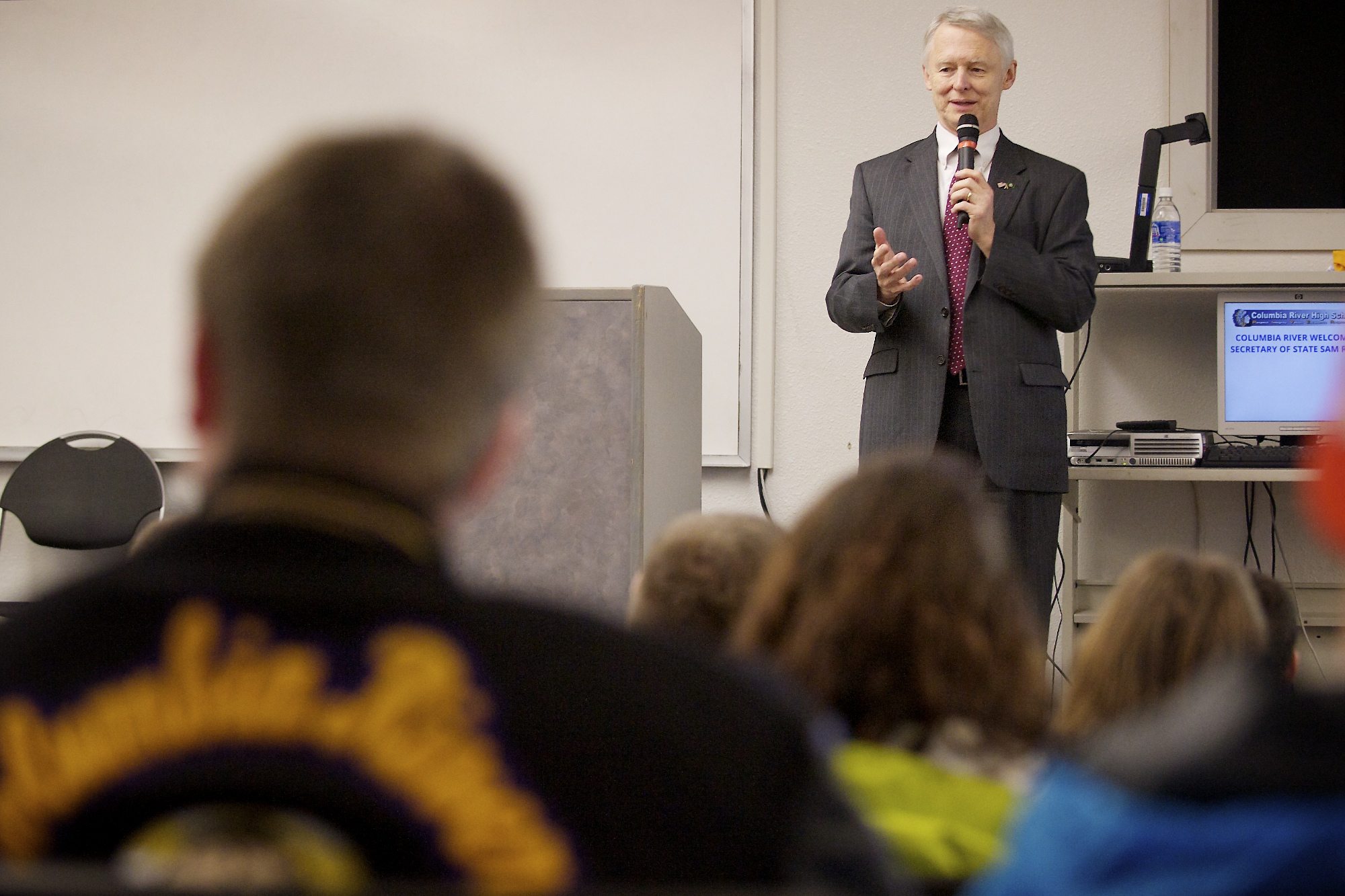When Washington Secretary of State Sam Reed inquired how many in the auditorium would be 18 years old by this November’s election, all students raised their hands.
“And how many of you are registered to vote?” Reed then asked the Columbia River High School crowd.
More than half of the hands dropped. That’s why the state’s top elections official had come to the Vancouver school, one of eight he’s visiting this week.
Reed joined Clark County Auditor Greg Kimsey and Thurston County Auditor Kim Wyman at Columbia River on Friday morning to talk about the importance of getting involved in the political process at a young age.
Voters in the 18-24 age group consistently have the lowest voter turnout, according to state documents. In the 2010 general election, about 40 percent of all registered Washington voters in that age group cast a vote, compared with about 70 percent of all registered voters.
People are less likely to vote in the first few years after they turn 18 if they don’t get started right away, Reed told The Columbian before his presentation.
“That’s why we’re focusing on young people,” he said. “I want to let them know how you do it.”
Voter turnout among the young has been on the rise during his tenure, Reed said, although he was quick to not take sole credit for the trend. Many young people were energized to vote during President Barack Obama’s 2008 campaign, for example.
But youth turnout also has risen in midterm elections. In 2006, only 32 percent of the youngest voting bloc participated, according to state documents. In at least some part, the jump from then to 2010 is attributed to voters’ being able to register online, said Patty Murphy, a voting systems specialist in Reed’s office.
Reed pushed the Legislature to make Washington the second state in the nation to allow online registration starting with the 2008 election.
He visits the state’s college campuses every April for a “civics tour,” he said. Because there are so many high schools in the state, he can’t visit all of them annually, instead directing county auditors to address those classrooms, Reed said.
But this week, Reed combined tours of the Longview and Vancouver ports with school appearances. In Clark County, he stopped at Hudson’s Bay and Skyview high schools on Thursday before the Friday visit at Columbia River.
Dave Douglas, a civics teacher for some of the assembled students, said he hopes having a state office-holder come to the school will impress upon students that government is all around them.
“I want them to know that it’s very possible to be involved, that it doesn’t take much effort to meet their government,” he said.
The school’s civics teachers regularly take students to city council and county commissioner meetings, Douglas said.
One local official shared the spotlight with Reed on Friday.
Kimsey reminded the students that they could register quickly and easily at clarkvotes.org, and that they wouldn’t have to give up their voting privileges if they moved away for college or joined the armed services.
“We mail ballots to Bangalore, India, to Burma and to the Congo,” said the Clark County auditor.
Wyman, who has Reed’s old Thurston County job, asked how many students thought politicians listened to them. Few hands rose.
“Why do you think that is?” she asked.
“Because we don’t vote,” one student said.
Wyman then demonstrated how a small fraction of voters makes decisions for everyone because of low election turnout. She had all students stand up.
She quickly showed that if the assembled group represented all voters, once one subtracts those not eligible to vote and those who don’t choose to vote, a handful of students ends up making decisions for the whole auditorium.
“You are about to enter the stage in your life when you have the most freedom you’ve ever had,” Wyman said. “But most of you will give away that most fundamental right you have as a citizen.”
Wyman and Reed were election observers in eastern Russia in 1997. Reed also monitored elections in Uganda in 1994.
In both countries, he saw young people excited about the possibility of democracy’s arrival, Reed said. Teenagers too young to vote came to polling sites just to watch the process, he said. Voting stations at colleges had a party atmosphere.
“But don’t we take it for granted here in America?” Reed said. “Give that some thought.”
He reminded students of the many important offices and issues on the ballot this fall. Beside the presidential election, Washington voters will choose a new governor, a U.S. senator, nine U.S. representatives, a state attorney general and, yes, a new secretary of state. Reed will not run for re-election, he announced last year.
Voters also will vote on one, possibly two, controversial initiatives that tend to provoke different responses in different age groups — legalization of marijuana and same-sex marriage, Reed said.
He encouraged students to get engaged in the local political system. Clark County is known as a swing county, which means it’s wooed by candidates, he said.
“Clark County is very important in statewide races,” Reed said.
Jacques Von Lunen: 360-735-4515; jacques.vonlunen@columbian.com; http://twitter.com/col_schools.



